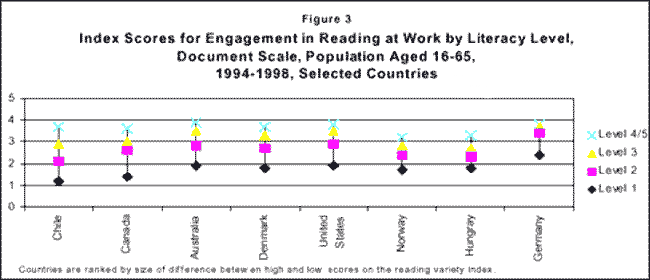Literacy must be viewed as a cause and a consequence of employment
success. The workplace affords the individual an opportunity to practice
literacy. Thus, an inability to find regular employment may result in
the decline of a person's skill level.
Whether literacy skills are practised in or out of the workplace, individuals
with higher literacy skills engage in literacy-related activities more
frequently and in greater depth. What is emerging is a pattern, a circle
of literacy that is common to literacy practice, training and education:
skills contribute to practice by allowing individuals to succeed in situations
where opportunities for practice are possible.

Literacy and Employment
Most employment creation in OECD countries is concentrated in sectors with high knowledge intensity. As a result, all types of skills - including literacy skills - can be expected to play an increasingly important role in wage determination. IALS data clearly indicate that the percentage of people with relatively high incomes increases with levels of literacy proficiency. For example, only 24 per cent of Canadians at prose literacy level 1 are in the top 60 per cent of wage earners, while this is the case for 69 per cent of Canadians at level 4/5 (see Figure 6). It is generally believed that this earnings gain arises in part because people with higher skills are more productive on the job and are therefore paid a wage premium. It also appears that in Canada, as well as in the United Kingdom and the United States, there is a larger return to quantitative (numeracy) skills than to prose skills.
The evidence also shows that literacy proficiency has a substantial effect on earnings in most IALS countries when other aspects of human capital, specifically educational attainment and experience, are taken into account. This is especially the case in Canada and Norway, where literacy proficiency is a stronger determinant of earnings than educational attainment. Overall, the evidence supports the notion - still rather new in the economic literature - that there is a measurable net return to literacy skills.